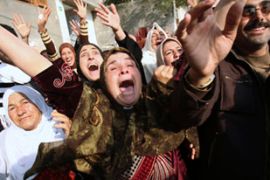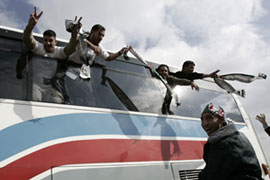Israel frees Palestinian prisoners
More than 200 men return to Palestinian areas in “goodwill gesture” by Tel Aviv.

Most of the prisoners released on Monday entered the Fatah-dominated West Bank through the Beitunia checkpoint.
Gaza return
But a small number returned to the Gaza Strip, which Fatah’s opponent Hamas has controlled since their fighters routed Fatah loyalists in the territory in June 2007.
|
“Today some of our brothers were released and sent back to their homes in the beloved Gaza Strip. We hope to God they were not freed from one prison only to enter another” Mahmoud Abbas, |
“Today some of our brothers were released and sent back to their homes in the beloved Gaza Strip. We hope to God they were not freed from one prison only to enter another,” Abbas said.
Israeli prison authorities had originally said 228 Palestinian prisoners would be released, with at least 18 of them heading to Gaza, but four of the prisoners were kept in custody.
“We’ve been reminded repeatedly today that almost 11,000 Palestinians remain behind Israeli bars,” Al Jazeera’s Nour Odeh, reporting from Beitunia, said.
“So it was a bittersweet moment, not just for Palestinians across the board, but even for those waiting for their loved ones [at Beitunia], knowing that their friends are still behind bars.”
The president said his pledge to continue efforts to secure the release of all Palestinians in Israeli jails extends to Hamas members.
Release delayed
Israel’s supreme court approved the release on Monday, several hours after the plan was thrown into doubt by judges who had ordered the release delayed until the state replied to a petition against it.
Israel decided to free the prisoners as a gesture of support for Abbas, coinciding with the Muslim festival of Eid al-Adha, but was postponed.
All the prisoners to be freed are members of Fatah’s armed wings, or other smaller groups, and none of them are from Hamas.
Israel has said the periodic release of small numbers of Fatah prisoners is aimed at boosting support for Abbas in his power struggle with Hamas.
Israel said the delay was due to a request from the Palestinians, although Palestinian officials denied this.
Later, Ban Ki-moon, the UN secretary general, hosted a meeting of the diplomatic Quartet on the Middle East in New York on the eve of a Security Council ministerial session aimed at giving fresh impetus to the peace process.
Security Council ambassadors are discussing a US-drafted text endorsing a number of principles agreed by the Israelis and Palestinians since the negotiations were revived in Annapolis, Maryland last year.
If adopted, the text would be the council’s first resolution on the Israeli-Palestinian conflict in five years.
Statesmen’s appeal
In another development, several international figures have signed a letter stating that Israeli restrictions on cash shipments to Gaza banks, meant to weaken the territory’s Hamas rulers, are largely counterproductive and ultimately harm Palestinian moderates.
 |
| Most of the prisoners freed by israel were supporters of Abbas’s Fatah party [AFP] |
Israel imposed restrictions on Gaza after Hamas seized the territory in June 2007, ousting Fatah supporters.
Israel declared Gaza a “hostile entity” and largely sealed its borders, allowing in only humanitarian supplies and a trickle of commercial goods, while banning exports from Gaza.
The letter to Ehud Olmert was signed by Robert Zoellick, the World Bank president; Dominique Strauss-Kahn, the International Monetary Fund’s managing director; and Tony Blair, the international Middle East Quartet’s envoy.
The three also expressed concern about a decision by two Israeli banks to sever correspondent relationships with their Palestinian counterparts.
The two developments “may have a considerable impact on the Palestinian economy and its institutions, and ultimately on Israel’s longer-term relationship with the Palestinians”, the letter said.